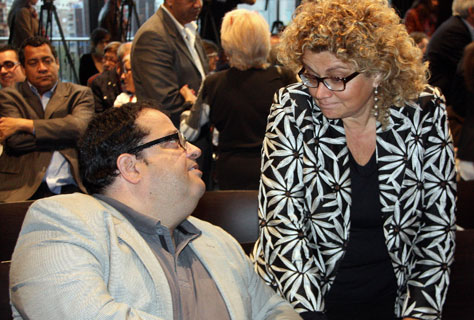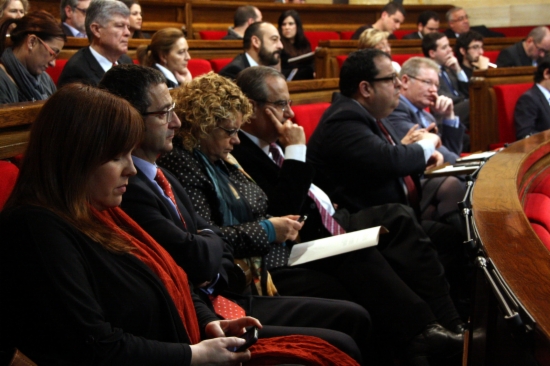16.01.2014 - 13:26
The division within PSC widens. Three members of the Catalan Socialist Party have voted in favor of the motion to ask the Spanish Congress for power to hold a referendum, against the wishes of their Executive Board. They face disciplinary action. ‘We defend the pluralism of the PSC,’ said Marina Geli in a press conference after the vote. ‘We had one of the five legal paths before us, to ask the Spanish government to allow us to hold a referendum,’ she added.
Rocío Martinez-Sampere announced that she would vote no on the motion by CiU, ERC, ICV-EUiA and the CUP to ask the Spanish Congress for the power to hold referendums, but she also said that profound change was required in the PSC, and that she would work to implement such change starting immediately and from the rank-and-file, and thus was resigning from PSC’s Executive Board. Shortly thereafter, Laia Bonet also announced on her blog that she would also resign from the party’s Executive Board.
Bonet said the threats of expulsion of members who break party discipline were very significant. ‘It’s pretty serious and distressing that threats of expulsion for our peers who have expressed doubt and contrary positions have come about before our parliamentary group’s negotation sessions,’ said Bonet.
In addition, she warned that she would not accept the parliamentary seat of any expelled PSC dissenter (which could be the case of Joan Ignasi Elena).
Martínez-Sampere votes ‘no’
‘My single abstention, alone, would not be instrumental in getting the country any closer to winning the referendum to which I am committed,’ she insisted. With Ros out of the Parliament, Marina Geli, Joan Ignasi Elena, and Núria Ventura are the three members who remain who still might break party discipline.
Today’s vote already claimed another victim: the mayor of Lleida, Àngle Ros, who announced he was giving up his seat yesterday because he did not share the position of the executive on Thursday’s vote. On the motion to ask the Spanish Congress for this power, he said, ‘This isn’t going anywhere, but it has a huge symbolic value and pressure on the PP’, he also noted that it was the second discrepancy, after last year’s on the Declaration of Sovereignty, and he asked that the dissenting members’ votes be respected.
‘All of us have a place in the PC,’ said Ros, ‘our colleagues with whom we share national and social aspirations for Catalonia, all of us have a place and are necessary to the Socialist project.’ Ros admitted that he was emotionally affected, and politically disappointed.
‘I can understand the Executive’s point of view, but I do not share it. I can’t share their rationale for the vote because there is no unity in the party,’ he added.
And he insisted that the position that he would have liked to have defended was abstention: ‘These last few weeks you will have heard me defend the option of abstention in tomorrow’s vote. We have to have our own position and abstain on others’. We don’t have to oppose tomorrow’s proposal, because it could open up opportunities. It has a certain power of pressure on the PP government, which has also rejected the proposals of PSC and PSOE.’
Division within the Socialist Parliamentary Group
The position against asking the Spanish Congress to transfer the powers for holding referendums has caused discomfort in many members of the party’s executive and among the parliamentary group. Not only are there five members of Parliament that already disobeyed Navarro a year ago, in the vote on the Declaration of Sovereignty (Ros, Geli, Elena, Núria Ventura and Rocío Sampere-Martínez), there are four additional members tending toward that position: Núria Parlón, Juli Fernàndez, Jaume Collboni and Xavier Sabaté, who would also like to abstain and who ask for discretion with their votes. The latter four don’t seem like they will break party discipline, but they may make their differences known publicly.
The motion
The motion being debated proposes sending a motion for an organic law to the Spanish Congress with a single article so that the Congress delegates to the Catalan Parliament ‘the powers to authorize, convoke, and celebrate a referendum so that Catalans can declare their intentions for the collective political future of Catalonia, according to the terms that are negotiated with the government of the state’. It also stipulates that the convocation of the referendum should be carried out by the Catalan Government within a year.
The document that explains the measure explains that the referendum ‘can fit perfectly well within the Constitution, because the Constitution doesn’t exclude the possibility of a referendum within an autonomous communitynor does it establish limits about their content’. The motion asks that Article 150.2 of the Spanish Constitution be applied, which envisions transfering or delegating to the autonomous communities, via an organic law, the powers that are under the jurisdiction of the Spanish State, as is the case of a convocation of a referendum.
The convocation of a referendum—adds the explanatory document—must be considered a ‘normal and completely comparable’ scenario to countries with a democratic tradition and nature, like Canadà (Quebec) or the United Kingdom (Scotland). In addition, it remarks that the Council of Europe ‘also considers the referendum as the most ideal and democratic mechanism for finding out the will of the citizens in questions of this type’. It also points out that the democratic principle, in which ‘our’ political system is base, ‘must allow the expression of the wil of the people of Catalonia in a moment in which socially and institutionally an undeniable majority exists.’




